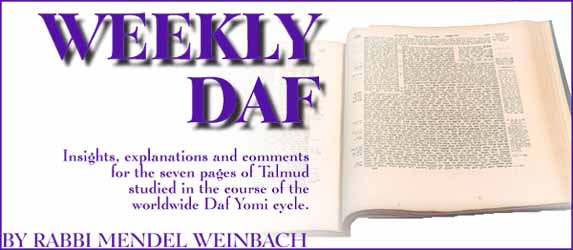Weekly Daf #195

Berachos 37 - 43 - Issue #195
3 - 9 Cheshvan 5758 / November 3 - 9 1997
3 - 9 Cheshvan 5758 / November 3 - 9 1997
This publication is also available in the following formats:
![]()
![]()
![]() Explanation of these symbols
Explanation of these symbols
The Right Word
What blessing does one make on bread?
Surely everyone knows the answer to that question is "Hamotzi lechem min ha'aretz" (He Who has brought bread forth from the earth).
But not all the Sages agreed on the first word of this phrase. One opinion is that "Motzi" should be said because it is past tense while "Hamotzi" is future tense. Since the bread you are about to eat has already been brought forth from the earth the past tense is more appropriate. There is a consensus that "Motzi" is past tense and a difference of opinion as to whether "Hamotzi" is as well.
It would therefore seem that the safe thing to do would be to say "Motzi," which is acceptable to all. Nevertheless, the ruling of the Gemara is that we say "Hamotzi," which is proper according to only one school of thought.
The reason for this, explains Tosefos on the basis of the Jerusalem Talmud, is that the preceding word in this blessing is "Haolam." If we were to follow it with "Motzi" we would have a word ending with an "m" sound coming before one which begins with an "m" sound, and face the risk of running the two words together as a single word.
But don't we face the same problem in regard to the two words "lechem" and "min"? True, adds Tosefos, but our Sages did not wish to tamper with the phrase "lechem min ha'aretz" which is taken from a passage in Tehillim (104:4). That passage, incidentally, contains ten words, notes Tosefos, and thus provides a hint to place the ten fingers of both our hands on the bread when we make our "Hamotzi" blessing on it.
The Fifth Sense
Where is the source in Scripture for the concept of making a blessing on the enjoyment we derive from a pleasant fragrance?
"Let every soul give praise to Hashem" says King David (Tehillim 150:6). What pleasure is there that only the soul enjoys and not the body? Surely it is the pleasure which comes from the sense of smell.
Maharsha notes that animals, like men, have fine senses, including the sense of smell, despite the fact that they have no souls. He suggests, however, that animals, which have only a life force and not a soul, do not have the capacity to enjoy the fragrances they smell (as an instinct to aid their survival), an enjoyment reserved for the soul within men.
An interesting observation about smell has been made by the great Chassidic thinkers. In the sin committed by Adam and Chava when they ate from the forbidden fruit of the Tree of Knowledge, virtually all of the senses were involved. They heard the incitement of the serpent, saw the beauty of the fruit, touched and tasted it. All of these senses therefore became affected with materialism. Only the sense of smell was not involved in this sin and it therefore remains pristine enough to still be enjoyed by the pure soul.
General Editor: Rabbi Moshe Newman
Production Design: Lev Seltzer
HTML Design: Eli Ballon
© 1997 Ohr Somayach International - All rights reserved. This publication may be distributed to another person intact without prior permission. We also encourage you to include this material in other publications, such as synagogue newsletters. However, we ask that you contact us beforehand for permission, and then send us a sample issue.
This publication is available via E-Mail
Ohr Somayach Institutions is an international network of Yeshivot and outreach centers, with branches in North America, Europe, South Africa and South America. The Central Campus in Jerusalem provides a full range of educational services for over 685 full-time students.
The Jewish Learning Exchange (JLE) of Ohr Somayach offers summer and winter programs in Israel that attract hundreds of university students from around the world for 3 to 8 weeks of study and touring.
Ohr Somayach's Web site is hosted by TeamGenesis
Dedication opportunities are available for Weekly Daf. Please contact us for details.






